International Financial Reporting: Standards, Compliance & Analysis
VerifiedAdded on 2023/06/13
|24
|5079
|421
Report
AI Summary
This report provides a comprehensive overview of international financial reporting, focusing on its context, purpose, and key principles as defined by conceptual and regulatory frameworks. It identifies the main stakeholders of an organization and analyzes how they benefit from financial information. The report explains the difference between International Accounting Standards (IAS) and International Financial Reporting Standards (IFRS), critically evaluating the benefits of IFRS. It also identifies the varying degrees of compliance with IFRS by organizations across the world and the factors in a nation which may impact compliance. The financial information of Morrisons is analyzed and interpreted in the appendix. The report highlights the auditing models used by businesses, emphasizing the value of financial reporting for meeting organizational objectives and growth. Desklib offers a platform to access this and similar solved assignments for students.
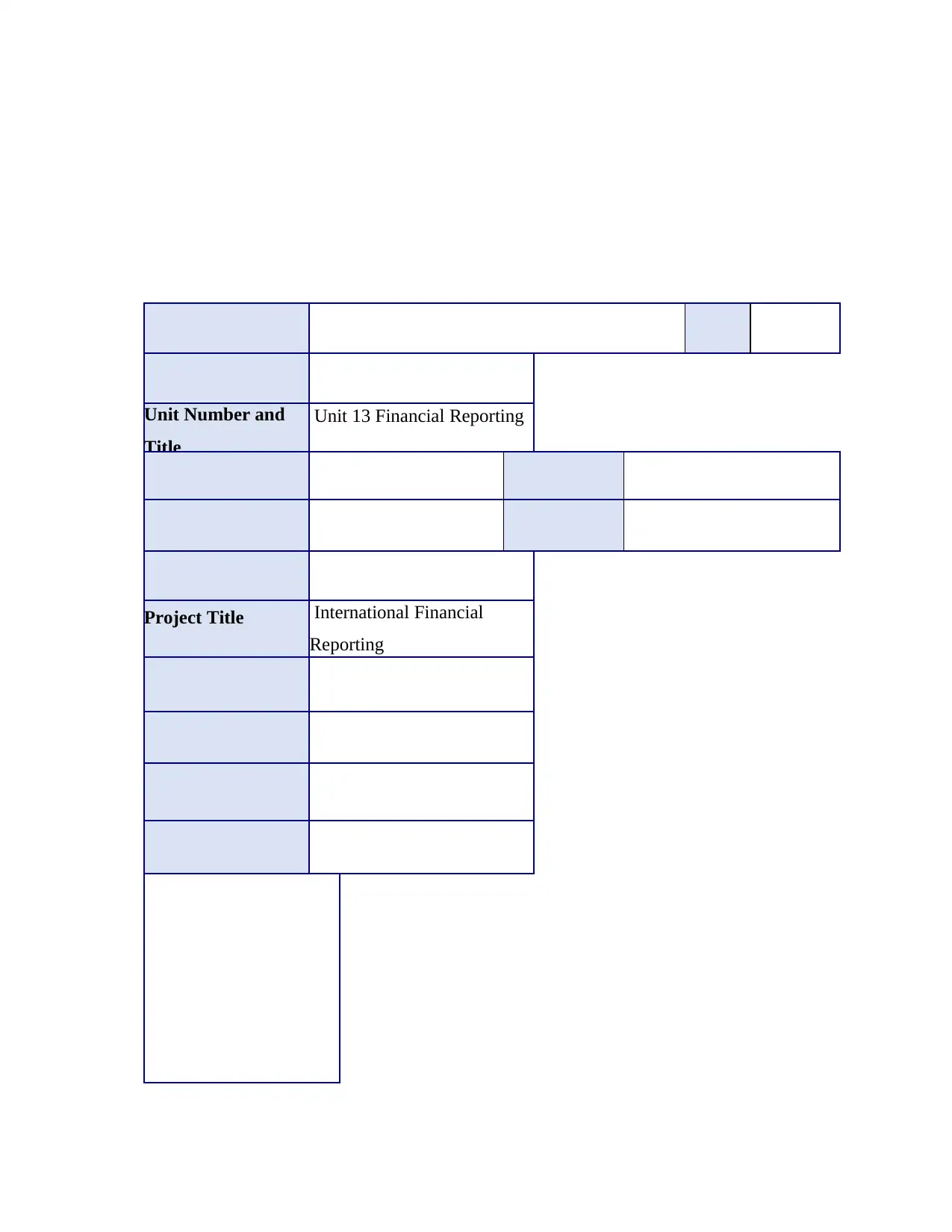
Unit Number and
Title
Unit 13 Financial Reporting
Project Title International Financial
Reporting
Title
Unit 13 Financial Reporting
Project Title International Financial
Reporting
Paraphrase This Document
Need a fresh take? Get an instant paraphrase of this document with our AI Paraphraser
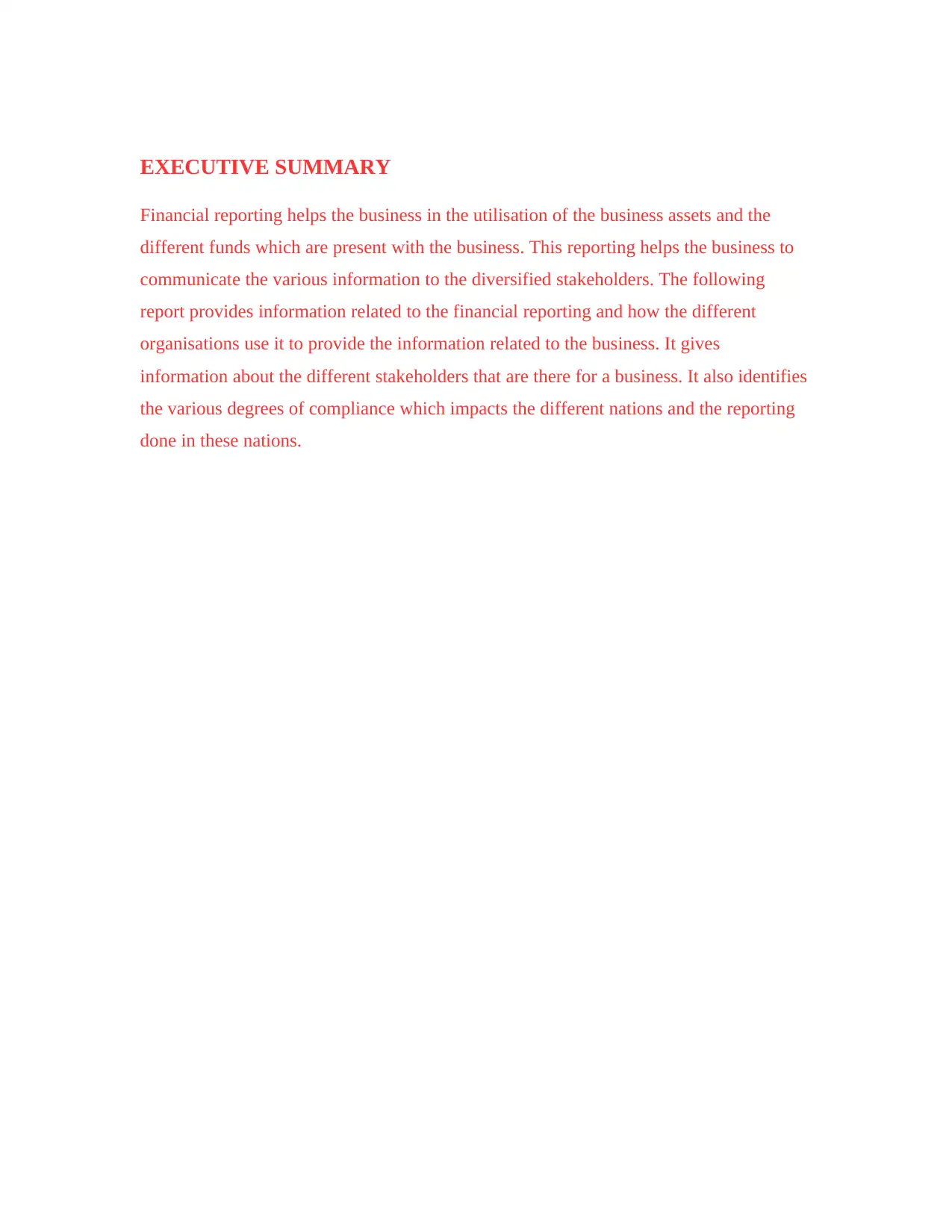
EXECUTIVE SUMMARY
Financial reporting helps the business in the utilisation of the business assets and the
different funds which are present with the business. This reporting helps the business to
communicate the various information to the diversified stakeholders. The following
report provides information related to the financial reporting and how the different
organisations use it to provide the information related to the business. It gives
information about the different stakeholders that are there for a business. It also identifies
the various degrees of compliance which impacts the different nations and the reporting
done in these nations.
Financial reporting helps the business in the utilisation of the business assets and the
different funds which are present with the business. This reporting helps the business to
communicate the various information to the diversified stakeholders. The following
report provides information related to the financial reporting and how the different
organisations use it to provide the information related to the business. It gives
information about the different stakeholders that are there for a business. It also identifies
the various degrees of compliance which impacts the different nations and the reporting
done in these nations.
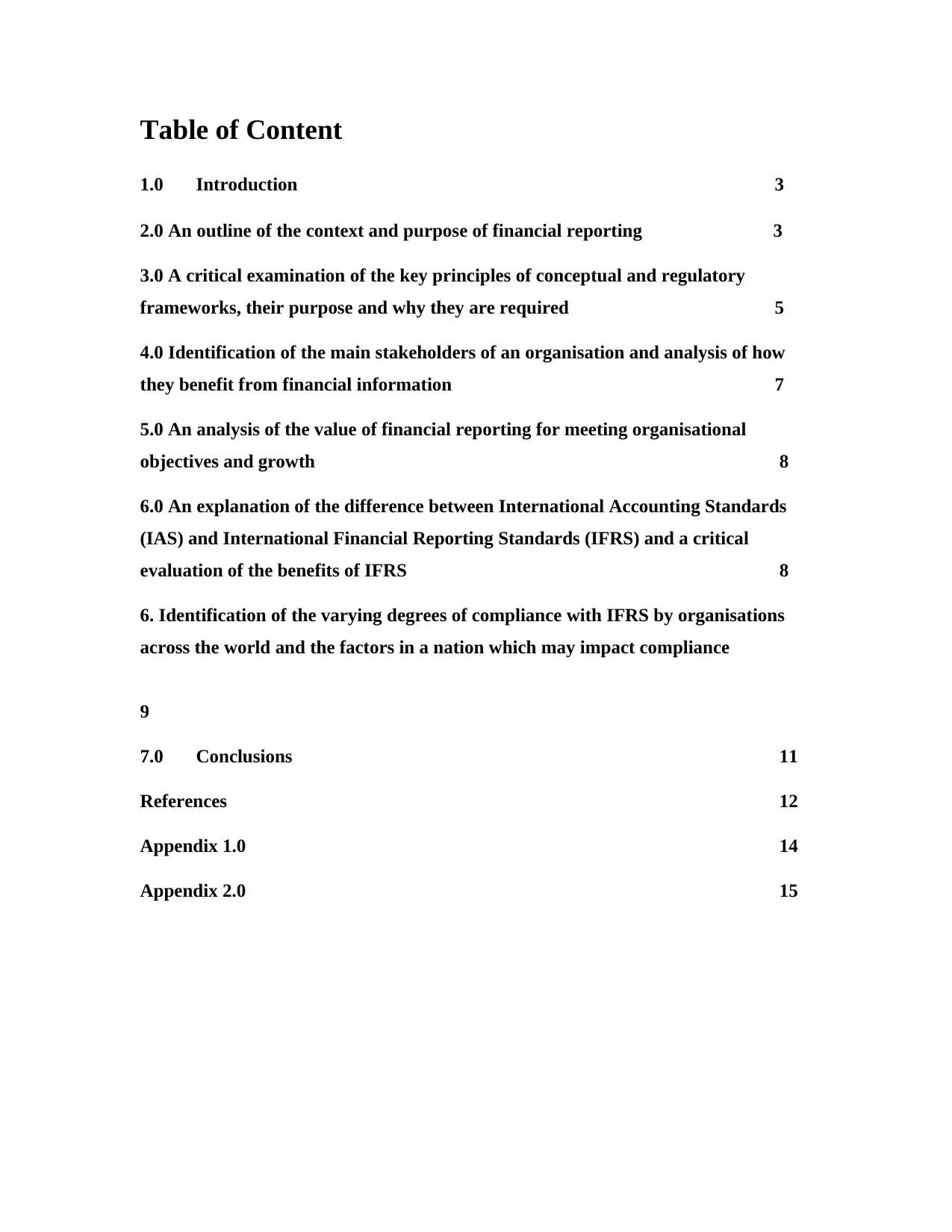
Table of Content
1.0 Introduction 3
2.0 An outline of the context and purpose of financial reporting 3
3.0 A critical examination of the key principles of conceptual and regulatory
frameworks, their purpose and why they are required 5
4.0 Identification of the main stakeholders of an organisation and analysis of how
they benefit from financial information 7
5.0 An analysis of the value of financial reporting for meeting organisational
objectives and growth 8
6.0 An explanation of the difference between International Accounting Standards
(IAS) and International Financial Reporting Standards (IFRS) and a critical
evaluation of the benefits of IFRS 8
6. Identification of the varying degrees of compliance with IFRS by organisations
across the world and the factors in a nation which may impact compliance
9
7.0 Conclusions 11
References 12
Appendix 1.0 14
Appendix 2.0 15
1.0 Introduction 3
2.0 An outline of the context and purpose of financial reporting 3
3.0 A critical examination of the key principles of conceptual and regulatory
frameworks, their purpose and why they are required 5
4.0 Identification of the main stakeholders of an organisation and analysis of how
they benefit from financial information 7
5.0 An analysis of the value of financial reporting for meeting organisational
objectives and growth 8
6.0 An explanation of the difference between International Accounting Standards
(IAS) and International Financial Reporting Standards (IFRS) and a critical
evaluation of the benefits of IFRS 8
6. Identification of the varying degrees of compliance with IFRS by organisations
across the world and the factors in a nation which may impact compliance
9
7.0 Conclusions 11
References 12
Appendix 1.0 14
Appendix 2.0 15
⊘ This is a preview!⊘
Do you want full access?
Subscribe today to unlock all pages.

Trusted by 1+ million students worldwide
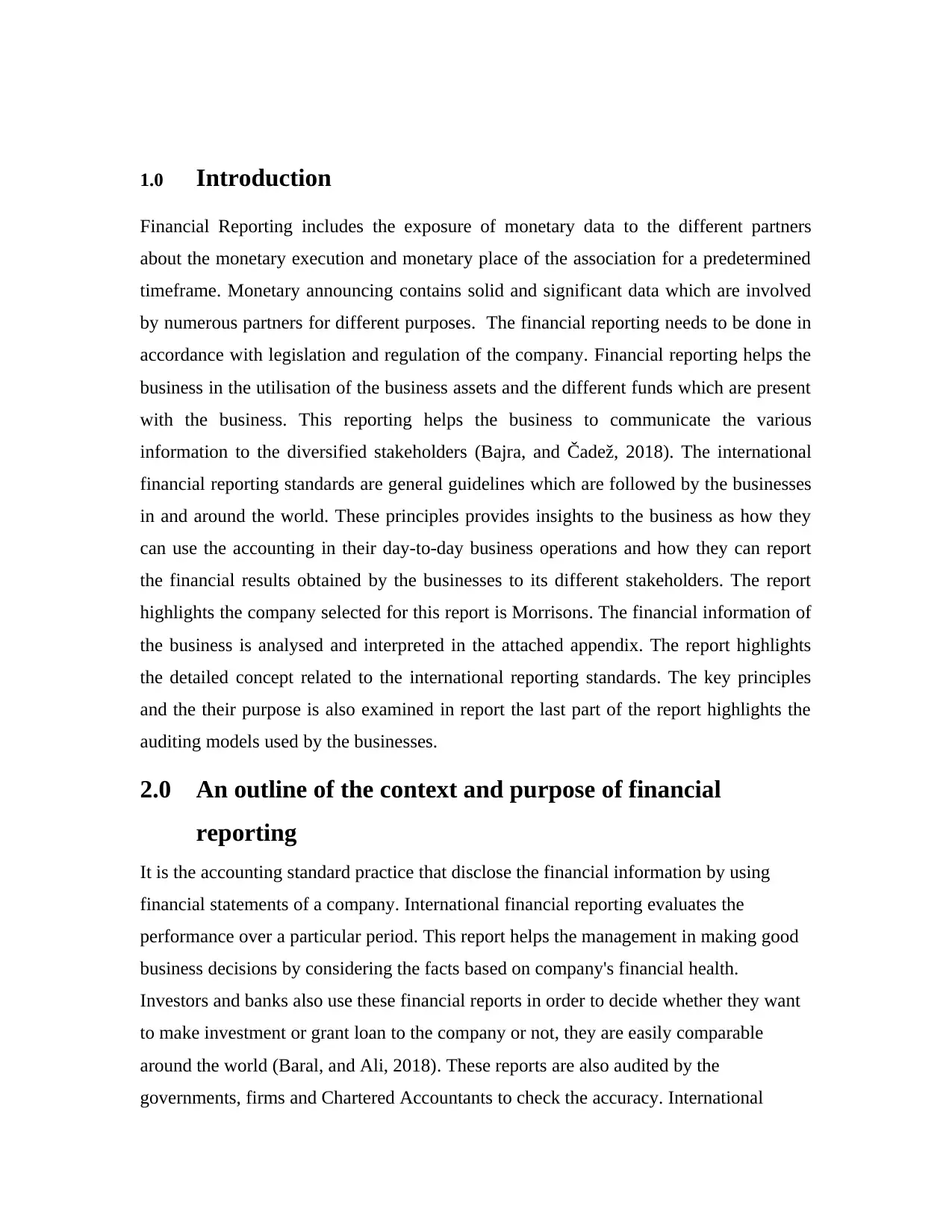
1.0 Introduction
Financial Reporting includes the exposure of monetary data to the different partners
about the monetary execution and monetary place of the association for a predetermined
timeframe. Monetary announcing contains solid and significant data which are involved
by numerous partners for different purposes. The financial reporting needs to be done in
accordance with legislation and regulation of the company. Financial reporting helps the
business in the utilisation of the business assets and the different funds which are present
with the business. This reporting helps the business to communicate the various
information to the diversified stakeholders (Bajra, and Čadež, 2018). The international
financial reporting standards are general guidelines which are followed by the businesses
in and around the world. These principles provides insights to the business as how they
can use the accounting in their day-to-day business operations and how they can report
the financial results obtained by the businesses to its different stakeholders. The report
highlights the company selected for this report is Morrisons. The financial information of
the business is analysed and interpreted in the attached appendix. The report highlights
the detailed concept related to the international reporting standards. The key principles
and the their purpose is also examined in report the last part of the report highlights the
auditing models used by the businesses.
2.0 An outline of the context and purpose of financial
reporting
It is the accounting standard practice that disclose the financial information by using
financial statements of a company. International financial reporting evaluates the
performance over a particular period. This report helps the management in making good
business decisions by considering the facts based on company's financial health.
Investors and banks also use these financial reports in order to decide whether they want
to make investment or grant loan to the company or not, they are easily comparable
around the world (Baral, and Ali, 2018). These reports are also audited by the
governments, firms and Chartered Accountants to check the accuracy. International
Financial Reporting includes the exposure of monetary data to the different partners
about the monetary execution and monetary place of the association for a predetermined
timeframe. Monetary announcing contains solid and significant data which are involved
by numerous partners for different purposes. The financial reporting needs to be done in
accordance with legislation and regulation of the company. Financial reporting helps the
business in the utilisation of the business assets and the different funds which are present
with the business. This reporting helps the business to communicate the various
information to the diversified stakeholders (Bajra, and Čadež, 2018). The international
financial reporting standards are general guidelines which are followed by the businesses
in and around the world. These principles provides insights to the business as how they
can use the accounting in their day-to-day business operations and how they can report
the financial results obtained by the businesses to its different stakeholders. The report
highlights the company selected for this report is Morrisons. The financial information of
the business is analysed and interpreted in the attached appendix. The report highlights
the detailed concept related to the international reporting standards. The key principles
and the their purpose is also examined in report the last part of the report highlights the
auditing models used by the businesses.
2.0 An outline of the context and purpose of financial
reporting
It is the accounting standard practice that disclose the financial information by using
financial statements of a company. International financial reporting evaluates the
performance over a particular period. This report helps the management in making good
business decisions by considering the facts based on company's financial health.
Investors and banks also use these financial reports in order to decide whether they want
to make investment or grant loan to the company or not, they are easily comparable
around the world (Baral, and Ali, 2018). These reports are also audited by the
governments, firms and Chartered Accountants to check the accuracy. International
Paraphrase This Document
Need a fresh take? Get an instant paraphrase of this document with our AI Paraphraser
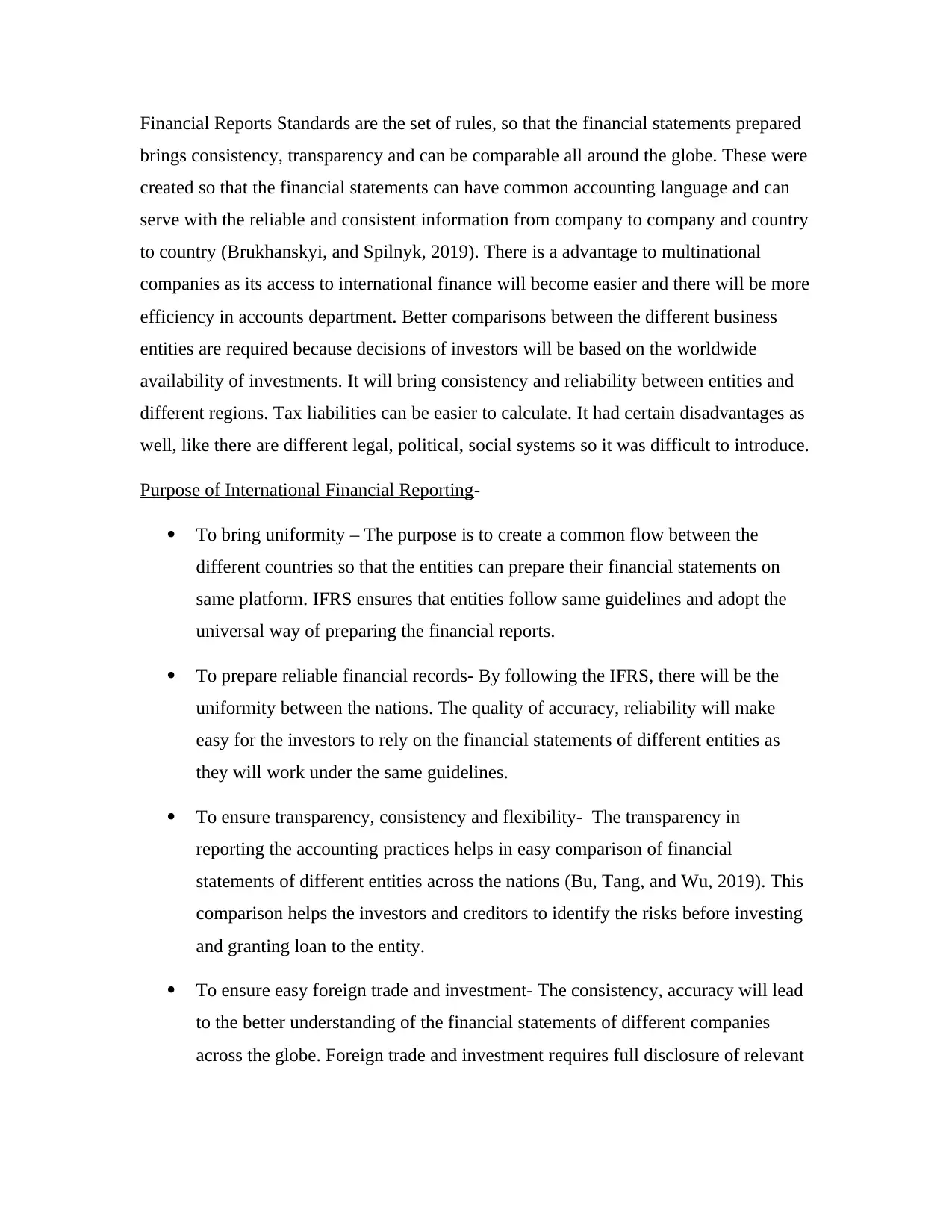
Financial Reports Standards are the set of rules, so that the financial statements prepared
brings consistency, transparency and can be comparable all around the globe. These were
created so that the financial statements can have common accounting language and can
serve with the reliable and consistent information from company to company and country
to country (Brukhanskyi, and Spilnyk, 2019). There is a advantage to multinational
companies as its access to international finance will become easier and there will be more
efficiency in accounts department. Better comparisons between the different business
entities are required because decisions of investors will be based on the worldwide
availability of investments. It will bring consistency and reliability between entities and
different regions. Tax liabilities can be easier to calculate. It had certain disadvantages as
well, like there are different legal, political, social systems so it was difficult to introduce.
Purpose of International Financial Reporting-
To bring uniformity – The purpose is to create a common flow between the
different countries so that the entities can prepare their financial statements on
same platform. IFRS ensures that entities follow same guidelines and adopt the
universal way of preparing the financial reports.
To prepare reliable financial records- By following the IFRS, there will be the
uniformity between the nations. The quality of accuracy, reliability will make
easy for the investors to rely on the financial statements of different entities as
they will work under the same guidelines.
To ensure transparency, consistency and flexibility- The transparency in
reporting the accounting practices helps in easy comparison of financial
statements of different entities across the nations (Bu, Tang, and Wu, 2019). This
comparison helps the investors and creditors to identify the risks before investing
and granting loan to the entity.
To ensure easy foreign trade and investment- The consistency, accuracy will lead
to the better understanding of the financial statements of different companies
across the globe. Foreign trade and investment requires full disclosure of relevant
brings consistency, transparency and can be comparable all around the globe. These were
created so that the financial statements can have common accounting language and can
serve with the reliable and consistent information from company to company and country
to country (Brukhanskyi, and Spilnyk, 2019). There is a advantage to multinational
companies as its access to international finance will become easier and there will be more
efficiency in accounts department. Better comparisons between the different business
entities are required because decisions of investors will be based on the worldwide
availability of investments. It will bring consistency and reliability between entities and
different regions. Tax liabilities can be easier to calculate. It had certain disadvantages as
well, like there are different legal, political, social systems so it was difficult to introduce.
Purpose of International Financial Reporting-
To bring uniformity – The purpose is to create a common flow between the
different countries so that the entities can prepare their financial statements on
same platform. IFRS ensures that entities follow same guidelines and adopt the
universal way of preparing the financial reports.
To prepare reliable financial records- By following the IFRS, there will be the
uniformity between the nations. The quality of accuracy, reliability will make
easy for the investors to rely on the financial statements of different entities as
they will work under the same guidelines.
To ensure transparency, consistency and flexibility- The transparency in
reporting the accounting practices helps in easy comparison of financial
statements of different entities across the nations (Bu, Tang, and Wu, 2019). This
comparison helps the investors and creditors to identify the risks before investing
and granting loan to the entity.
To ensure easy foreign trade and investment- The consistency, accuracy will lead
to the better understanding of the financial statements of different companies
across the globe. Foreign trade and investment requires full disclosure of relevant
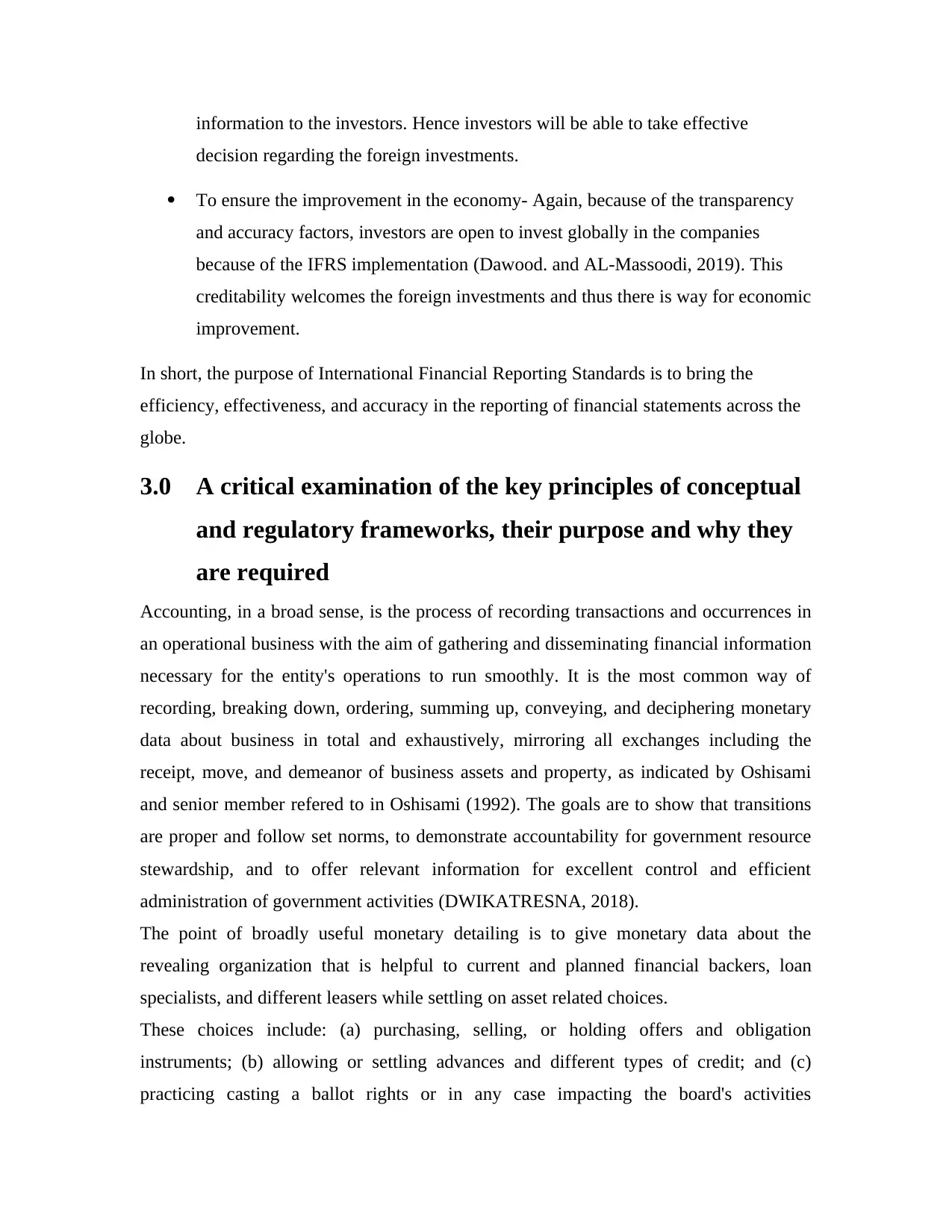
information to the investors. Hence investors will be able to take effective
decision regarding the foreign investments.
To ensure the improvement in the economy- Again, because of the transparency
and accuracy factors, investors are open to invest globally in the companies
because of the IFRS implementation (Dawood. and AL-Massoodi, 2019). This
creditability welcomes the foreign investments and thus there is way for economic
improvement.
In short, the purpose of International Financial Reporting Standards is to bring the
efficiency, effectiveness, and accuracy in the reporting of financial statements across the
globe.
3.0 A critical examination of the key principles of conceptual
and regulatory frameworks, their purpose and why they
are required
Accounting, in a broad sense, is the process of recording transactions and occurrences in
an operational business with the aim of gathering and disseminating financial information
necessary for the entity's operations to run smoothly. It is the most common way of
recording, breaking down, ordering, summing up, conveying, and deciphering monetary
data about business in total and exhaustively, mirroring all exchanges including the
receipt, move, and demeanor of business assets and property, as indicated by Oshisami
and senior member refered to in Oshisami (1992). The goals are to show that transitions
are proper and follow set norms, to demonstrate accountability for government resource
stewardship, and to offer relevant information for excellent control and efficient
administration of government activities (DWIKATRESNA, 2018).
The point of broadly useful monetary detailing is to give monetary data about the
revealing organization that is helpful to current and planned financial backers, loan
specialists, and different leasers while settling on asset related choices.
These choices include: (a) purchasing, selling, or holding offers and obligation
instruments; (b) allowing or settling advances and different types of credit; and (c)
practicing casting a ballot rights or in any case impacting the board's activities
decision regarding the foreign investments.
To ensure the improvement in the economy- Again, because of the transparency
and accuracy factors, investors are open to invest globally in the companies
because of the IFRS implementation (Dawood. and AL-Massoodi, 2019). This
creditability welcomes the foreign investments and thus there is way for economic
improvement.
In short, the purpose of International Financial Reporting Standards is to bring the
efficiency, effectiveness, and accuracy in the reporting of financial statements across the
globe.
3.0 A critical examination of the key principles of conceptual
and regulatory frameworks, their purpose and why they
are required
Accounting, in a broad sense, is the process of recording transactions and occurrences in
an operational business with the aim of gathering and disseminating financial information
necessary for the entity's operations to run smoothly. It is the most common way of
recording, breaking down, ordering, summing up, conveying, and deciphering monetary
data about business in total and exhaustively, mirroring all exchanges including the
receipt, move, and demeanor of business assets and property, as indicated by Oshisami
and senior member refered to in Oshisami (1992). The goals are to show that transitions
are proper and follow set norms, to demonstrate accountability for government resource
stewardship, and to offer relevant information for excellent control and efficient
administration of government activities (DWIKATRESNA, 2018).
The point of broadly useful monetary detailing is to give monetary data about the
revealing organization that is helpful to current and planned financial backers, loan
specialists, and different leasers while settling on asset related choices.
These choices include: (a) purchasing, selling, or holding offers and obligation
instruments; (b) allowing or settling advances and different types of credit; and (c)
practicing casting a ballot rights or in any case impacting the board's activities
⊘ This is a preview!⊘
Do you want full access?
Subscribe today to unlock all pages.

Trusted by 1+ million students worldwide
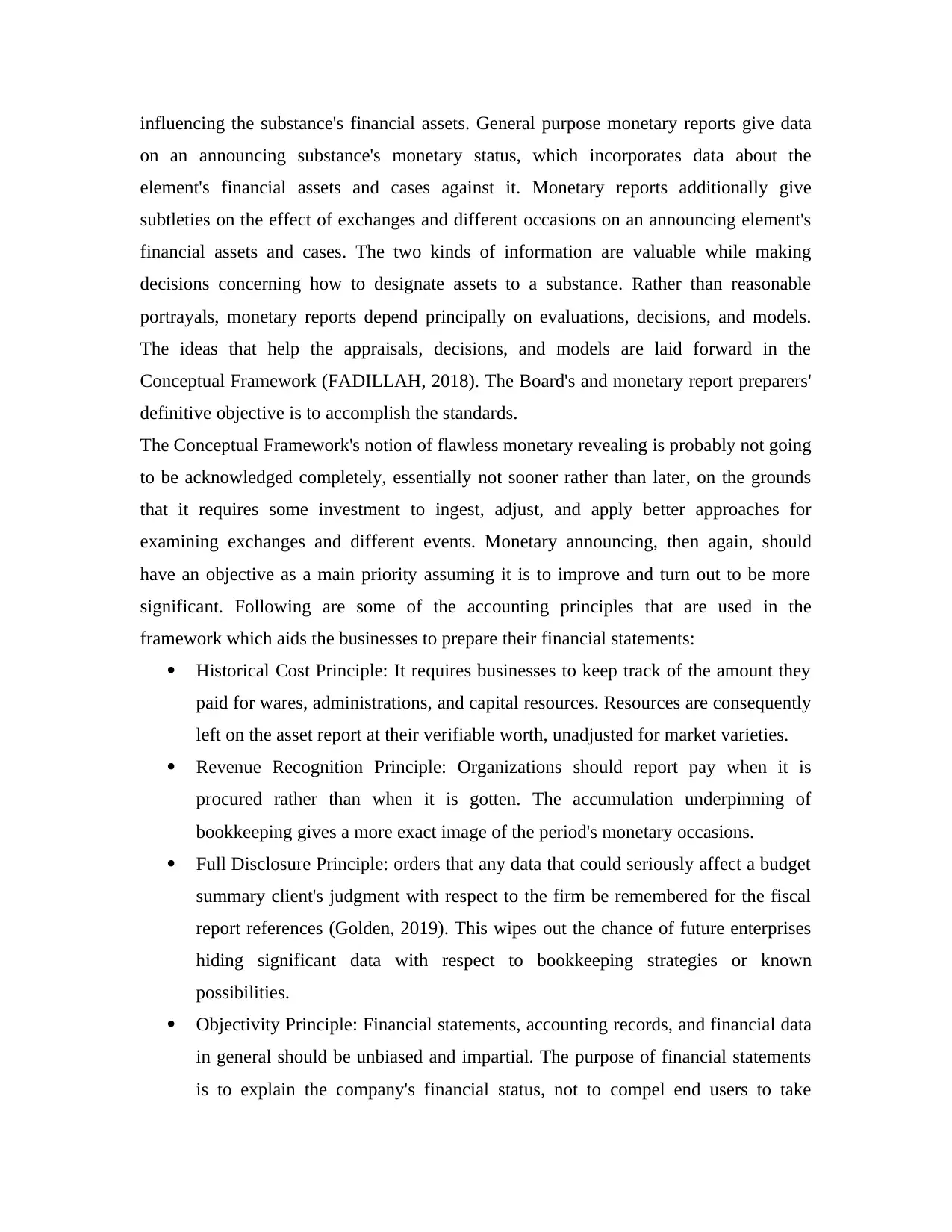
influencing the substance's financial assets. General purpose monetary reports give data
on an announcing substance's monetary status, which incorporates data about the
element's financial assets and cases against it. Monetary reports additionally give
subtleties on the effect of exchanges and different occasions on an announcing element's
financial assets and cases. The two kinds of information are valuable while making
decisions concerning how to designate assets to a substance. Rather than reasonable
portrayals, monetary reports depend principally on evaluations, decisions, and models.
The ideas that help the appraisals, decisions, and models are laid forward in the
Conceptual Framework (FADILLAH, 2018). The Board's and monetary report preparers'
definitive objective is to accomplish the standards.
The Conceptual Framework's notion of flawless monetary revealing is probably not going
to be acknowledged completely, essentially not sooner rather than later, on the grounds
that it requires some investment to ingest, adjust, and apply better approaches for
examining exchanges and different events. Monetary announcing, then again, should
have an objective as a main priority assuming it is to improve and turn out to be more
significant. Following are some of the accounting principles that are used in the
framework which aids the businesses to prepare their financial statements:
Historical Cost Principle: It requires businesses to keep track of the amount they
paid for wares, administrations, and capital resources. Resources are consequently
left on the asset report at their verifiable worth, unadjusted for market varieties.
Revenue Recognition Principle: Organizations should report pay when it is
procured rather than when it is gotten. The accumulation underpinning of
bookkeeping gives a more exact image of the period's monetary occasions.
Full Disclosure Principle: orders that any data that could seriously affect a budget
summary client's judgment with respect to the firm be remembered for the fiscal
report references (Golden, 2019). This wipes out the chance of future enterprises
hiding significant data with respect to bookkeeping strategies or known
possibilities.
Objectivity Principle: Financial statements, accounting records, and financial data
in general should be unbiased and impartial. The purpose of financial statements
is to explain the company's financial status, not to compel end users to take
on an announcing substance's monetary status, which incorporates data about the
element's financial assets and cases against it. Monetary reports additionally give
subtleties on the effect of exchanges and different occasions on an announcing element's
financial assets and cases. The two kinds of information are valuable while making
decisions concerning how to designate assets to a substance. Rather than reasonable
portrayals, monetary reports depend principally on evaluations, decisions, and models.
The ideas that help the appraisals, decisions, and models are laid forward in the
Conceptual Framework (FADILLAH, 2018). The Board's and monetary report preparers'
definitive objective is to accomplish the standards.
The Conceptual Framework's notion of flawless monetary revealing is probably not going
to be acknowledged completely, essentially not sooner rather than later, on the grounds
that it requires some investment to ingest, adjust, and apply better approaches for
examining exchanges and different events. Monetary announcing, then again, should
have an objective as a main priority assuming it is to improve and turn out to be more
significant. Following are some of the accounting principles that are used in the
framework which aids the businesses to prepare their financial statements:
Historical Cost Principle: It requires businesses to keep track of the amount they
paid for wares, administrations, and capital resources. Resources are consequently
left on the asset report at their verifiable worth, unadjusted for market varieties.
Revenue Recognition Principle: Organizations should report pay when it is
procured rather than when it is gotten. The accumulation underpinning of
bookkeeping gives a more exact image of the period's monetary occasions.
Full Disclosure Principle: orders that any data that could seriously affect a budget
summary client's judgment with respect to the firm be remembered for the fiscal
report references (Golden, 2019). This wipes out the chance of future enterprises
hiding significant data with respect to bookkeeping strategies or known
possibilities.
Objectivity Principle: Financial statements, accounting records, and financial data
in general should be unbiased and impartial. The purpose of financial statements
is to explain the company's financial status, not to compel end users to take
Paraphrase This Document
Need a fresh take? Get an instant paraphrase of this document with our AI Paraphraser
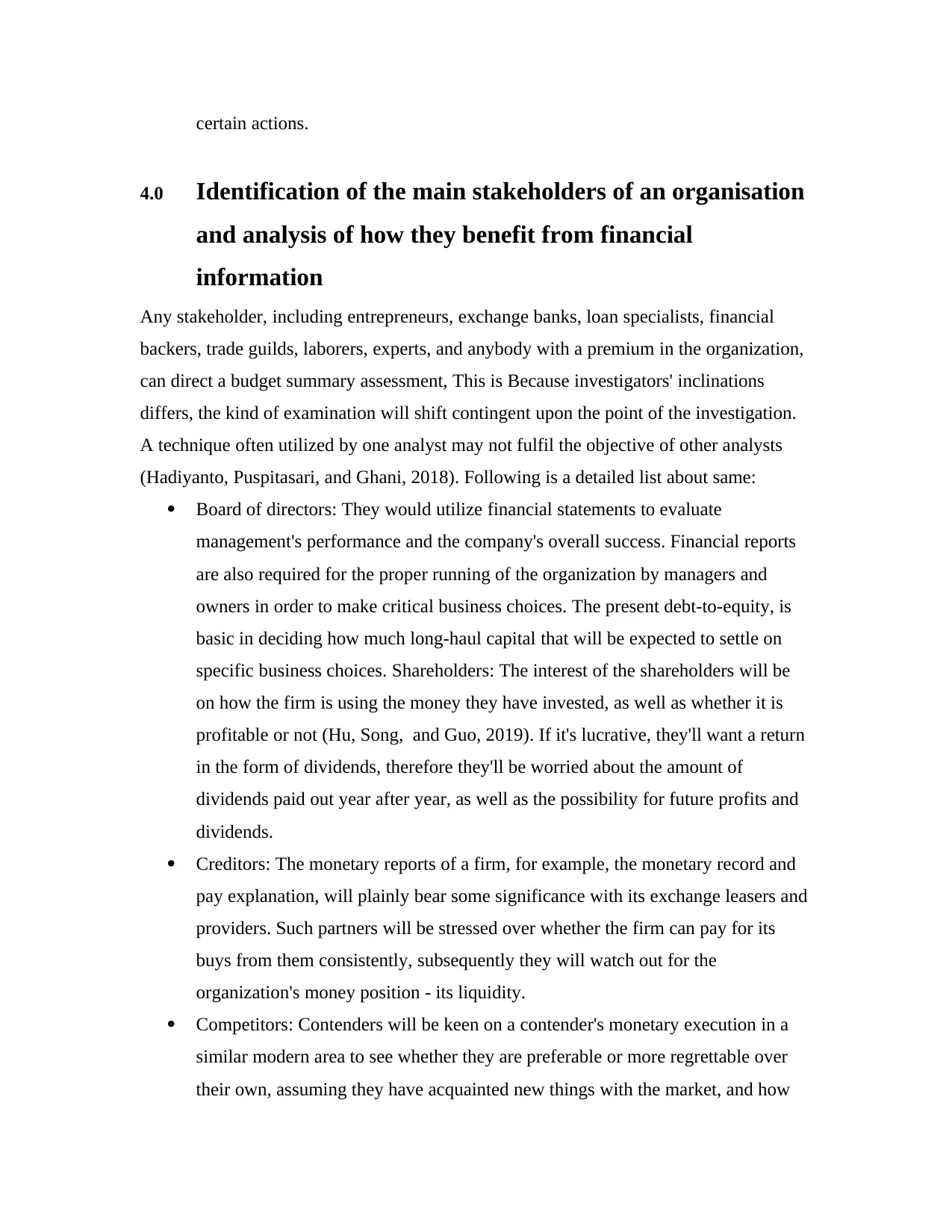
certain actions.
4.0 Identification of the main stakeholders of an organisation
and analysis of how they benefit from financial
information
Any stakeholder, including entrepreneurs, exchange banks, loan specialists, financial
backers, trade guilds, laborers, experts, and anybody with a premium in the organization,
can direct a budget summary assessment, This is Because investigators' inclinations
differs, the kind of examination will shift contingent upon the point of the investigation.
A technique often utilized by one analyst may not fulfil the objective of other analysts
(Hadiyanto, Puspitasari, and Ghani, 2018). Following is a detailed list about same:
Board of directors: They would utilize financial statements to evaluate
management's performance and the company's overall success. Financial reports
are also required for the proper running of the organization by managers and
owners in order to make critical business choices. The present debt-to-equity, is
basic in deciding how much long-haul capital that will be expected to settle on
specific business choices. Shareholders: The interest of the shareholders will be
on how the firm is using the money they have invested, as well as whether it is
profitable or not (Hu, Song, and Guo, 2019). If it's lucrative, they'll want a return
in the form of dividends, therefore they'll be worried about the amount of
dividends paid out year after year, as well as the possibility for future profits and
dividends.
Creditors: The monetary reports of a firm, for example, the monetary record and
pay explanation, will plainly bear some significance with its exchange leasers and
providers. Such partners will be stressed over whether the firm can pay for its
buys from them consistently, subsequently they will watch out for the
organization's money position - its liquidity.
Competitors: Contenders will be keen on a contender's monetary execution in a
similar modern area to see whether they are preferable or more regrettable over
their own, assuming they have acquainted new things with the market, and how
4.0 Identification of the main stakeholders of an organisation
and analysis of how they benefit from financial
information
Any stakeholder, including entrepreneurs, exchange banks, loan specialists, financial
backers, trade guilds, laborers, experts, and anybody with a premium in the organization,
can direct a budget summary assessment, This is Because investigators' inclinations
differs, the kind of examination will shift contingent upon the point of the investigation.
A technique often utilized by one analyst may not fulfil the objective of other analysts
(Hadiyanto, Puspitasari, and Ghani, 2018). Following is a detailed list about same:
Board of directors: They would utilize financial statements to evaluate
management's performance and the company's overall success. Financial reports
are also required for the proper running of the organization by managers and
owners in order to make critical business choices. The present debt-to-equity, is
basic in deciding how much long-haul capital that will be expected to settle on
specific business choices. Shareholders: The interest of the shareholders will be
on how the firm is using the money they have invested, as well as whether it is
profitable or not (Hu, Song, and Guo, 2019). If it's lucrative, they'll want a return
in the form of dividends, therefore they'll be worried about the amount of
dividends paid out year after year, as well as the possibility for future profits and
dividends.
Creditors: The monetary reports of a firm, for example, the monetary record and
pay explanation, will plainly bear some significance with its exchange leasers and
providers. Such partners will be stressed over whether the firm can pay for its
buys from them consistently, subsequently they will watch out for the
organization's money position - its liquidity.
Competitors: Contenders will be keen on a contender's monetary execution in a
similar modern area to see whether they are preferable or more regrettable over
their own, assuming they have acquainted new things with the market, and how
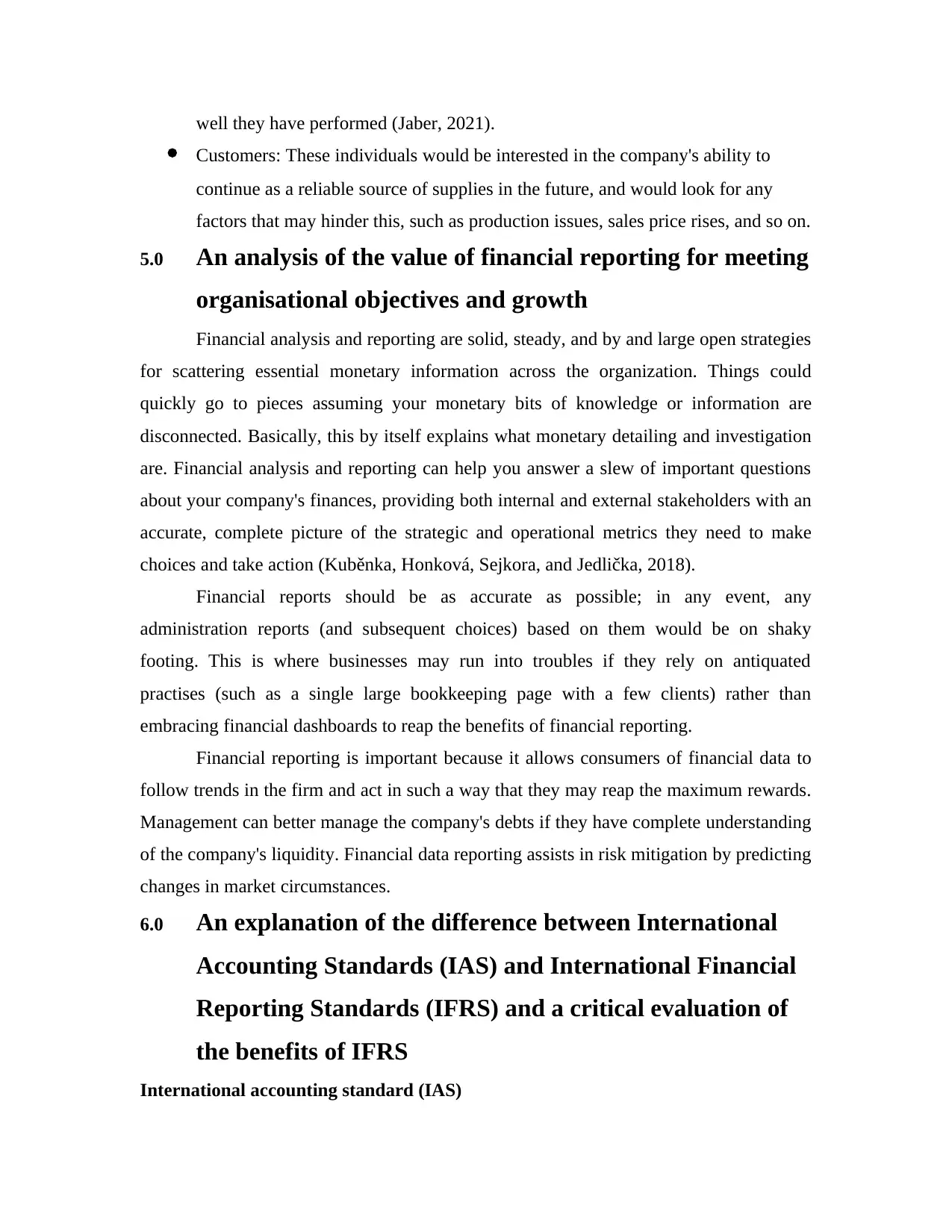
well they have performed (Jaber, 2021).
Customers: These individuals would be interested in the company's ability to
continue as a reliable source of supplies in the future, and would look for any
factors that may hinder this, such as production issues, sales price rises, and so on.
5.0 An analysis of the value of financial reporting for meeting
organisational objectives and growth
Financial analysis and reporting are solid, steady, and by and large open strategies
for scattering essential monetary information across the organization. Things could
quickly go to pieces assuming your monetary bits of knowledge or information are
disconnected. Basically, this by itself explains what monetary detailing and investigation
are. Financial analysis and reporting can help you answer a slew of important questions
about your company's finances, providing both internal and external stakeholders with an
accurate, complete picture of the strategic and operational metrics they need to make
choices and take action (Kuběnka, Honková, Sejkora, and Jedlička, 2018).
Financial reports should be as accurate as possible; in any event, any
administration reports (and subsequent choices) based on them would be on shaky
footing. This is where businesses may run into troubles if they rely on antiquated
practises (such as a single large bookkeeping page with a few clients) rather than
embracing financial dashboards to reap the benefits of financial reporting.
Financial reporting is important because it allows consumers of financial data to
follow trends in the firm and act in such a way that they may reap the maximum rewards.
Management can better manage the company's debts if they have complete understanding
of the company's liquidity. Financial data reporting assists in risk mitigation by predicting
changes in market circumstances.
6.0 An explanation of the difference between International
Accounting Standards (IAS) and International Financial
Reporting Standards (IFRS) and a critical evaluation of
the benefits of IFRS
International accounting standard (IAS)
Customers: These individuals would be interested in the company's ability to
continue as a reliable source of supplies in the future, and would look for any
factors that may hinder this, such as production issues, sales price rises, and so on.
5.0 An analysis of the value of financial reporting for meeting
organisational objectives and growth
Financial analysis and reporting are solid, steady, and by and large open strategies
for scattering essential monetary information across the organization. Things could
quickly go to pieces assuming your monetary bits of knowledge or information are
disconnected. Basically, this by itself explains what monetary detailing and investigation
are. Financial analysis and reporting can help you answer a slew of important questions
about your company's finances, providing both internal and external stakeholders with an
accurate, complete picture of the strategic and operational metrics they need to make
choices and take action (Kuběnka, Honková, Sejkora, and Jedlička, 2018).
Financial reports should be as accurate as possible; in any event, any
administration reports (and subsequent choices) based on them would be on shaky
footing. This is where businesses may run into troubles if they rely on antiquated
practises (such as a single large bookkeeping page with a few clients) rather than
embracing financial dashboards to reap the benefits of financial reporting.
Financial reporting is important because it allows consumers of financial data to
follow trends in the firm and act in such a way that they may reap the maximum rewards.
Management can better manage the company's debts if they have complete understanding
of the company's liquidity. Financial data reporting assists in risk mitigation by predicting
changes in market circumstances.
6.0 An explanation of the difference between International
Accounting Standards (IAS) and International Financial
Reporting Standards (IFRS) and a critical evaluation of
the benefits of IFRS
International accounting standard (IAS)
⊘ This is a preview!⊘
Do you want full access?
Subscribe today to unlock all pages.

Trusted by 1+ million students worldwide
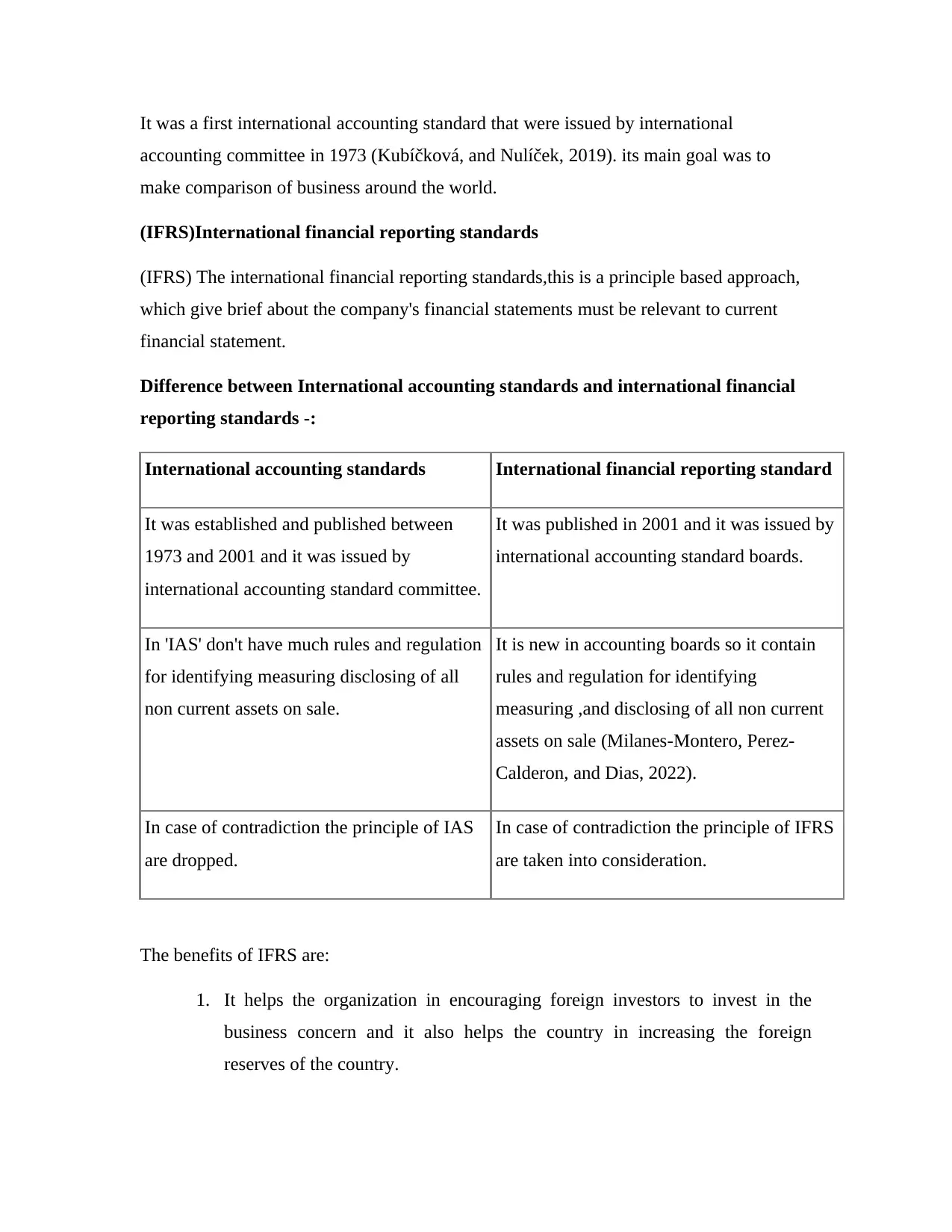
It was a first international accounting standard that were issued by international
accounting committee in 1973 (Kubíčková, and Nulíček, 2019). its main goal was to
make comparison of business around the world.
(IFRS)International financial reporting standards
(IFRS) The international financial reporting standards,this is a principle based approach,
which give brief about the company's financial statements must be relevant to current
financial statement.
Difference between International accounting standards and international financial
reporting standards -:
International accounting standards International financial reporting standard
It was established and published between
1973 and 2001 and it was issued by
international accounting standard committee.
It was published in 2001 and it was issued by
international accounting standard boards.
In 'IAS' don't have much rules and regulation
for identifying measuring disclosing of all
non current assets on sale.
It is new in accounting boards so it contain
rules and regulation for identifying
measuring ,and disclosing of all non current
assets on sale (Milanes-Montero, Perez-
Calderon, and Dias, 2022).
In case of contradiction the principle of IAS
are dropped.
In case of contradiction the principle of IFRS
are taken into consideration.
The benefits of IFRS are:
1. It helps the organization in encouraging foreign investors to invest in the
business concern and it also helps the country in increasing the foreign
reserves of the country.
accounting committee in 1973 (Kubíčková, and Nulíček, 2019). its main goal was to
make comparison of business around the world.
(IFRS)International financial reporting standards
(IFRS) The international financial reporting standards,this is a principle based approach,
which give brief about the company's financial statements must be relevant to current
financial statement.
Difference between International accounting standards and international financial
reporting standards -:
International accounting standards International financial reporting standard
It was established and published between
1973 and 2001 and it was issued by
international accounting standard committee.
It was published in 2001 and it was issued by
international accounting standard boards.
In 'IAS' don't have much rules and regulation
for identifying measuring disclosing of all
non current assets on sale.
It is new in accounting boards so it contain
rules and regulation for identifying
measuring ,and disclosing of all non current
assets on sale (Milanes-Montero, Perez-
Calderon, and Dias, 2022).
In case of contradiction the principle of IAS
are dropped.
In case of contradiction the principle of IFRS
are taken into consideration.
The benefits of IFRS are:
1. It helps the organization in encouraging foreign investors to invest in the
business concern and it also helps the country in increasing the foreign
reserves of the country.
Paraphrase This Document
Need a fresh take? Get an instant paraphrase of this document with our AI Paraphraser
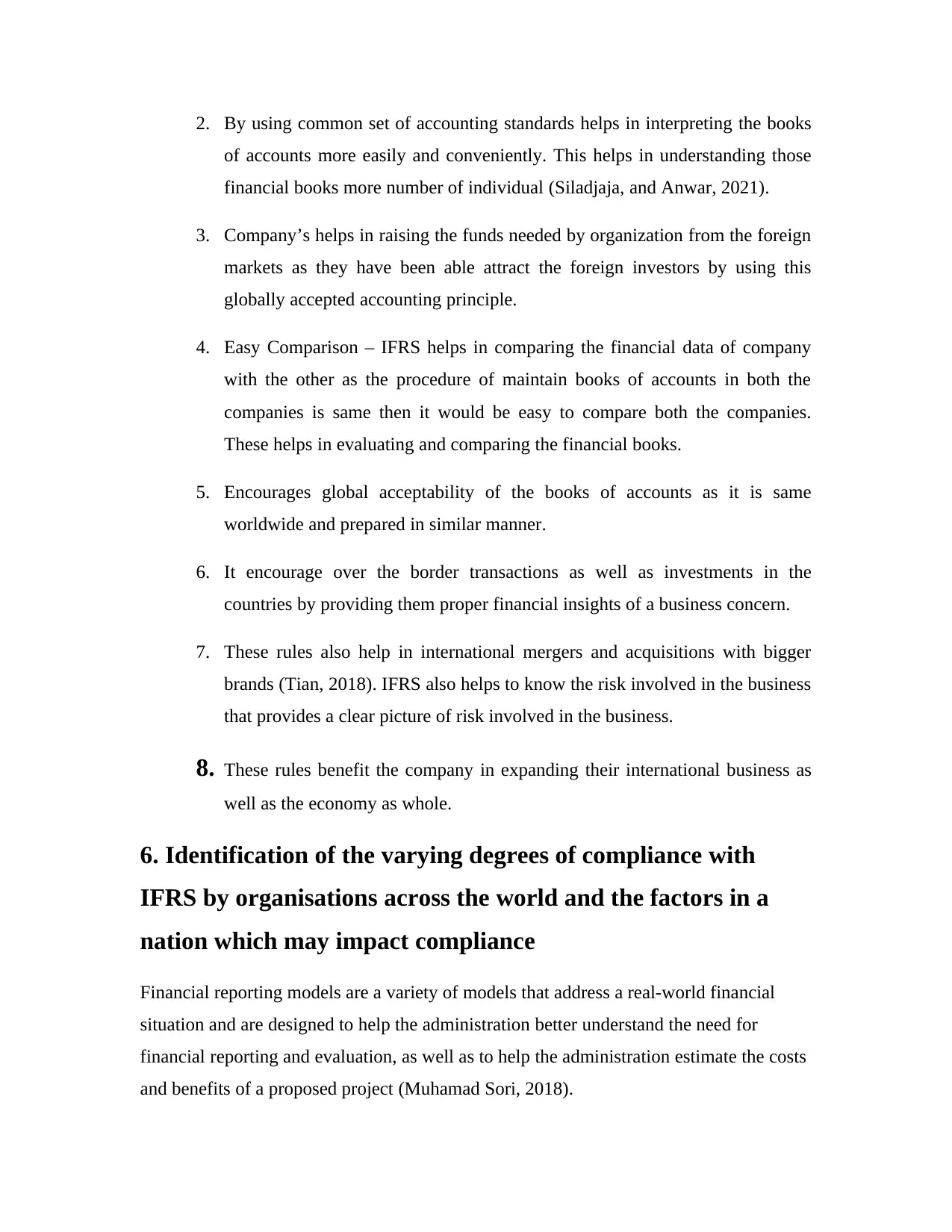
2. By using common set of accounting standards helps in interpreting the books
of accounts more easily and conveniently. This helps in understanding those
financial books more number of individual (Siladjaja, and Anwar, 2021).
3. Company’s helps in raising the funds needed by organization from the foreign
markets as they have been able attract the foreign investors by using this
globally accepted accounting principle.
4. Easy Comparison – IFRS helps in comparing the financial data of company
with the other as the procedure of maintain books of accounts in both the
companies is same then it would be easy to compare both the companies.
These helps in evaluating and comparing the financial books.
5. Encourages global acceptability of the books of accounts as it is same
worldwide and prepared in similar manner.
6. It encourage over the border transactions as well as investments in the
countries by providing them proper financial insights of a business concern.
7. These rules also help in international mergers and acquisitions with bigger
brands (Tian, 2018). IFRS also helps to know the risk involved in the business
that provides a clear picture of risk involved in the business.
8. These rules benefit the company in expanding their international business as
well as the economy as whole.
6. Identification of the varying degrees of compliance with
IFRS by organisations across the world and the factors in a
nation which may impact compliance
Financial reporting models are a variety of models that address a real-world financial
situation and are designed to help the administration better understand the need for
financial reporting and evaluation, as well as to help the administration estimate the costs
and benefits of a proposed project (Muhamad Sori, 2018).
of accounts more easily and conveniently. This helps in understanding those
financial books more number of individual (Siladjaja, and Anwar, 2021).
3. Company’s helps in raising the funds needed by organization from the foreign
markets as they have been able attract the foreign investors by using this
globally accepted accounting principle.
4. Easy Comparison – IFRS helps in comparing the financial data of company
with the other as the procedure of maintain books of accounts in both the
companies is same then it would be easy to compare both the companies.
These helps in evaluating and comparing the financial books.
5. Encourages global acceptability of the books of accounts as it is same
worldwide and prepared in similar manner.
6. It encourage over the border transactions as well as investments in the
countries by providing them proper financial insights of a business concern.
7. These rules also help in international mergers and acquisitions with bigger
brands (Tian, 2018). IFRS also helps to know the risk involved in the business
that provides a clear picture of risk involved in the business.
8. These rules benefit the company in expanding their international business as
well as the economy as whole.
6. Identification of the varying degrees of compliance with
IFRS by organisations across the world and the factors in a
nation which may impact compliance
Financial reporting models are a variety of models that address a real-world financial
situation and are designed to help the administration better understand the need for
financial reporting and evaluation, as well as to help the administration estimate the costs
and benefits of a proposed project (Muhamad Sori, 2018).
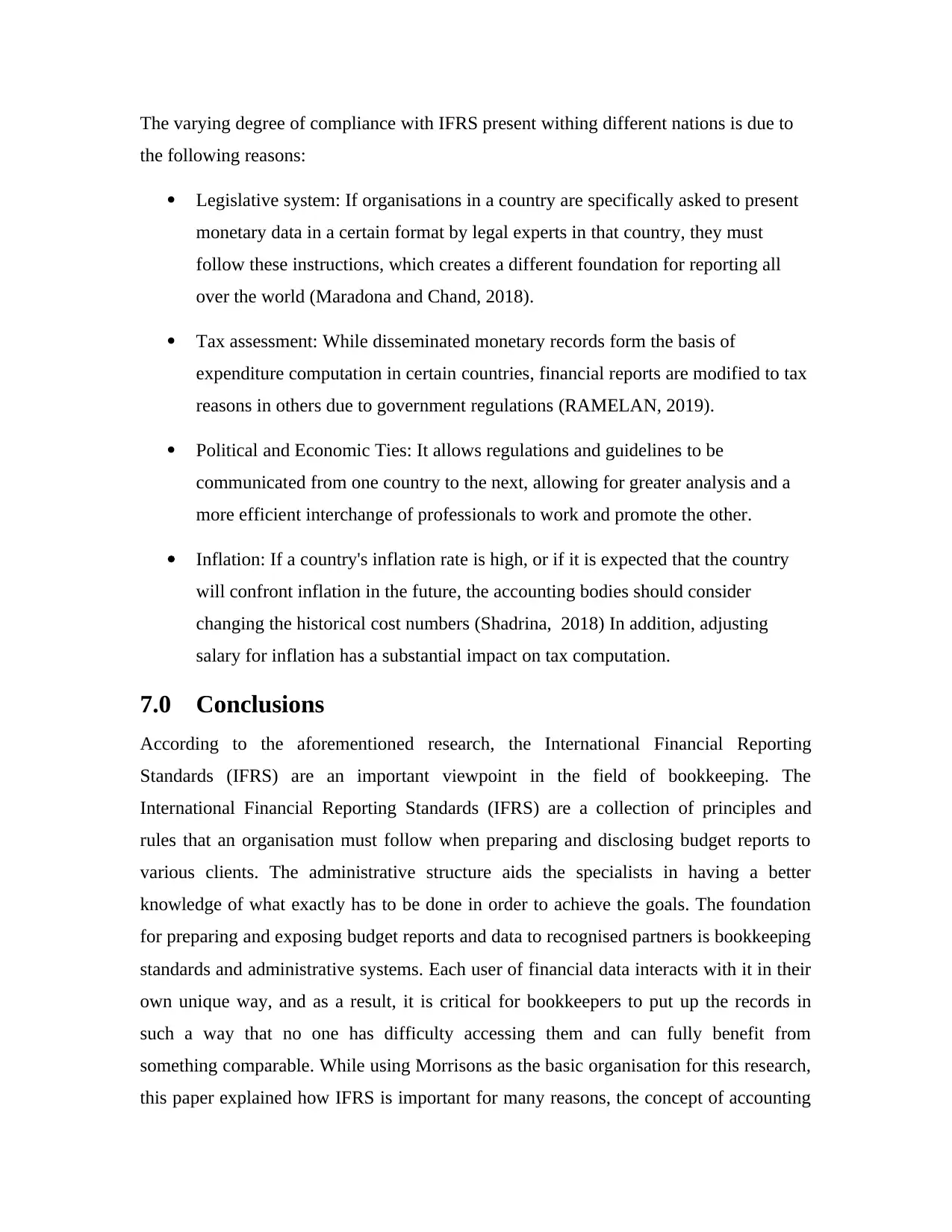
The varying degree of compliance with IFRS present withing different nations is due to
the following reasons:
Legislative system: If organisations in a country are specifically asked to present
monetary data in a certain format by legal experts in that country, they must
follow these instructions, which creates a different foundation for reporting all
over the world (Maradona and Chand, 2018).
Tax assessment: While disseminated monetary records form the basis of
expenditure computation in certain countries, financial reports are modified to tax
reasons in others due to government regulations (RAMELAN, 2019).
Political and Economic Ties: It allows regulations and guidelines to be
communicated from one country to the next, allowing for greater analysis and a
more efficient interchange of professionals to work and promote the other.
Inflation: If a country's inflation rate is high, or if it is expected that the country
will confront inflation in the future, the accounting bodies should consider
changing the historical cost numbers (Shadrina, 2018) In addition, adjusting
salary for inflation has a substantial impact on tax computation.
7.0 Conclusions
According to the aforementioned research, the International Financial Reporting
Standards (IFRS) are an important viewpoint in the field of bookkeeping. The
International Financial Reporting Standards (IFRS) are a collection of principles and
rules that an organisation must follow when preparing and disclosing budget reports to
various clients. The administrative structure aids the specialists in having a better
knowledge of what exactly has to be done in order to achieve the goals. The foundation
for preparing and exposing budget reports and data to recognised partners is bookkeeping
standards and administrative systems. Each user of financial data interacts with it in their
own unique way, and as a result, it is critical for bookkeepers to put up the records in
such a way that no one has difficulty accessing them and can fully benefit from
something comparable. While using Morrisons as the basic organisation for this research,
this paper explained how IFRS is important for many reasons, the concept of accounting
the following reasons:
Legislative system: If organisations in a country are specifically asked to present
monetary data in a certain format by legal experts in that country, they must
follow these instructions, which creates a different foundation for reporting all
over the world (Maradona and Chand, 2018).
Tax assessment: While disseminated monetary records form the basis of
expenditure computation in certain countries, financial reports are modified to tax
reasons in others due to government regulations (RAMELAN, 2019).
Political and Economic Ties: It allows regulations and guidelines to be
communicated from one country to the next, allowing for greater analysis and a
more efficient interchange of professionals to work and promote the other.
Inflation: If a country's inflation rate is high, or if it is expected that the country
will confront inflation in the future, the accounting bodies should consider
changing the historical cost numbers (Shadrina, 2018) In addition, adjusting
salary for inflation has a substantial impact on tax computation.
7.0 Conclusions
According to the aforementioned research, the International Financial Reporting
Standards (IFRS) are an important viewpoint in the field of bookkeeping. The
International Financial Reporting Standards (IFRS) are a collection of principles and
rules that an organisation must follow when preparing and disclosing budget reports to
various clients. The administrative structure aids the specialists in having a better
knowledge of what exactly has to be done in order to achieve the goals. The foundation
for preparing and exposing budget reports and data to recognised partners is bookkeeping
standards and administrative systems. Each user of financial data interacts with it in their
own unique way, and as a result, it is critical for bookkeepers to put up the records in
such a way that no one has difficulty accessing them and can fully benefit from
something comparable. While using Morrisons as the basic organisation for this research,
this paper explained how IFRS is important for many reasons, the concept of accounting
⊘ This is a preview!⊘
Do you want full access?
Subscribe today to unlock all pages.

Trusted by 1+ million students worldwide
1 out of 24
Related Documents
Your All-in-One AI-Powered Toolkit for Academic Success.
+13062052269
info@desklib.com
Available 24*7 on WhatsApp / Email
![[object Object]](/_next/static/media/star-bottom.7253800d.svg)
Unlock your academic potential
Copyright © 2020–2026 A2Z Services. All Rights Reserved. Developed and managed by ZUCOL.




